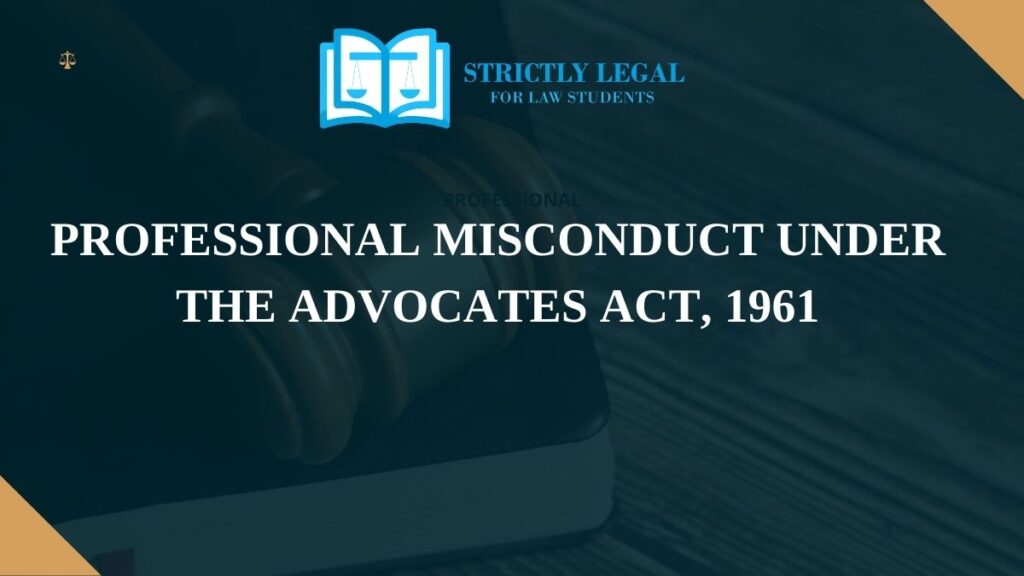The profession of a lawyer is meant to be sacred and divine by every means. It is quite implied that any person who is into their profession, is expected to follow the norms of the professional ethics it offers. But like every other profession, advocacy also undergoes certain professional misconduct. In a layman’s term, professional misconduct simply portrays the act or behavior that deem to be unfit for the profession as well as against the expectations of the field a person is into. The term has been clearly defined in Black’s Dictionary as, “the transgression of some established and definite rule of action, a forbidden act, a dereliction of duty, unlawful behavior, improper or wrong behavior.” Now, from the definition of Professional Misconduct, it can be easily contended that it is performed solely with an intent to gain something unlawfully. However, the Bar Council of India and The Advocates Act, 1961 have an important role in providing rules and regulations with regard to the code of conduct and other matters as such concerning the advocates practicing in India.
Table of Contents
Allocations of a profession
As mentioned above, the term “misconduct” simply means that any act which is unlawful in nature even though they are not fundamentally wrongful. Before the enactment of the Advocates Act, it was the Legal Practitioners Act of 1879. there is still no such term as ‘misconduct’ in the act, but the term ‘professional misconduct’ is being used in the said act. A few specimens of the professional misconduct are as follows:
- Professional Negligence
- Dereliction of duty
- Contradicting Sides
- Contempt of Court or inappropriate behavior before a Magistrate
- Impoverishing false information
- Disowning allegiance of a court
- Offering or suggesting to bribe the court officials
- Forcing the witness of the prosecution to not provide the truth
- Misleading the clients in court
More About the Advocates Act, 1961
Section 35 of the Advocates Act, 1961 mentions about the Professional Misconduct of advocates and lawyers in India. A person who is found guilty of Professional Misconduct shall be referred to a disciplinary committee and a date of hearing shall be fixed for the same. Post that, a show cause notice shall be issued to the advocate guilty as well the advocate general of the State. After hearing both the parties, the Disciplinary Committee may dismiss the complaint or where the proceedings were initiated at the State Bar Council or reprimand the advocate or suspend the advocate from practice for a period that deems fit to the committee or remove the name of an advocate from the state roll of advocates.
It is to be kept in mind that there is no hard and fast definition for the term “Professional Misconduct”, instead it offers a much broader meaning. Section 49 of the Advocates Act, 1961 gives power to the Bar Council of India to frame rules and standards of a professional misconduct. Under this act, it has been made clear that no individual holds the right to make an advertisement or solicit as it is solely against the code of ethics.
Duties of an Advocate
As you have read above, the Advocates in India are governed by the Advocates Act, 1961. In addition to that, the Bar Council of India was created by the Parliament of India under the Act. It is a statutory body that modulates and represents the Indian Bar. It authorizes standards of professional conduct and etiquette and exercises disciplinary jurisdiction.
An Advocate’s duty towards the Court is to-
- Act in a dignified manner before the Honorable Court of Law
- To maintain and keep a respectful attitude towards the Honorable Court of Law
- Not to influence the court by any illegal means
- Not to appear in matters of pecuniary interests
- To appear in proper uniform or dress code
- Not to wear bands or gowns in public places
- Refuse to appear in front of relations
Interpretation of the word “Professional Misconduct”
In the case of State of Punjab v. Ram Singh Ex. Constable; the Honorable Apex Court had observed that the misconduct in any office may be defined as unlawful behavior or neglect by a public officer, by which the rights of a party have been affected. Further, the Court also contended that in order to show professional misconduct, it may include the following:
- Moral Turpitude
- improper or wrongful behavior
- unlawful behavior
- willful in character
- a forbidden act
- transgression
- carelessness or negligence in the performance of duty
- or the act complained of bears forbidden quality or character
Here, Moral Turpitude portrays an act or behavior that soberly violates the sentiments or accepted standards of the community. Section 24A of the Advocates Act, 1961 states that no person shall be admitted as an advocate on a State roll if he is convicted of an offence that involves moral turpitude. In addition to that, if moral turpitude is committed by an individual who is already enrolled as an advocate then the Bar Council of India along with its Disciplinary Committee can take up the matter to their hands and impose suitable punishments.
Precedents relating to Professional Misconduct
In the case of Shambhu Ram v. Hanum Das Khatry, the respondent here wrote a letter to his client asking him to bribe the Honorable Judge in order to win the case. Here, the respondent was guilty of Professional Misconduct u/s 35 of the Advocates Act for bribing a judge in the case as a result the State Bar Council suspended the respondent for a period of two years for trying to bribe a judge.
In L.C. Goyal v. Suresh Joshi, the advocate misappropriated the money of amount Rs. 25,951/- received by him as court fees. Misappropriation means using the money for anything else but court purposes as promised to the client. For this act of him, the Honorable Supreme Court held him guilty for professional misconduct.
Conclusion
Advocacy is considered to be a noble profession that involves professional ethics, unlike any other profession. The Honorable Courts of Law of India have dealt with various professional misconduct cases that have also dealt with an attempt to murder by the advocate towards his client. Hence, the interference of authorities concerned is duly done here to keep individuals having a criminal background away from the purity of justice. To keep the freshly emerged advocates away from any of such ill practices the Bar Council shall make a new and crisp programme to aware and realize them the dos and don’ts.

Law student.
Turning legal insights into engaging narratives.




